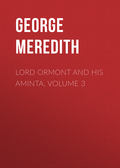
George Meredith
Complete Short Works of George Meredith
CHAPTER VI
Politeness required that General Ople should not appear to rejoice in his dismissal as a suitor, and should at least make some show of holding himself at the beck of a reconsidering mind. He was guilty of running up to London early next day, and remaining absent until nightfall; and he did the same on the two following days. When he presented himself at Lady Camper’s lodge-gates, the astonishing intelligence, that her ladyship had departed for the Continent and Egypt gave him qualms of remorse, which assumed a more definite shape in something like awe of her triumphant constitution. He forbore to mention her age, for he was the most honourable of men, but a habit of tea-table talkativeness impelled him to say and repeat an idea that had visited him, to the effect, that Lady Camper was one of those wonderful women who are comparable to brilliant generals, and defend themselves from the siege of Time by various aggressive movements. Fearful of not being understood, owing to the rarity of the occasions when the squat plain squad of honest Saxon regulars at his command were called upon to explain an idea, he re-cast the sentence. But, as it happened that the regulars of his vocabulary were not numerous, and not accustomed to work upon thoughts and images, his repetitions rather succeeded in exposing the piece of knowledge he had recently acquired than in making his meaning plainer. So we need not marvel that his acquaintances should suppose him to be secretly aware of an extreme degree in which Lady Camper was a veteran.
General Ople entered into the gaieties of the neighbourhood once more, and passed through the Winter cheerfully. In justice to him, however, it should be said that to the intent dwelling of his mind upon Lady Camper, and not to the festive life he led, was due his entire ignorance of his daughter’s unhappiness. She lived with him, and yet it was in other houses he learnt that she was unhappy. After his last interview with Lady Camper, he had informed Elizabeth of the ruinous and preposterous amount of money demanded of him for a settlement upon her and Elizabeth, like the girl of good sense that she was, had replied immediately, ‘It could not be thought of, papa.’
He had spoken to Reginald likewise. The young man fell into a dramatic tearing-of-hair and long-stride fury, not ill becoming an enamoured dragoon. But he maintained that his aunt, though an eccentric, was a cordially kind woman. He seemed to feel, if he did not partly hint, that the General might have accepted Lady Camper’s terms. The young officer could no longer be welcome at Douro Lodge, so the General paid him a morning call at his quarters, and was distressed to find him breakfasting very late, tapping eggs that he forgot to open—one of the surest signs of a young man downright and deep in love, as the General knew from experience—and surrounded by uncut sporting journals of past weeks, which dated from the day when his blow had struck him, as accurately as the watch of the drowned man marks his minute. Lady Camper had gone to Italy, and was in communication with her nephew: Reginald was not further explicit. His legs were very prominent in his despair, and his fingers frequently performed the part of blunt combs; consequently the General was impressed by his passion for Elizabeth. The girl who, if she was often meditative, always met his eyes with a smile, and quietly said ‘Yes, papa,’ and ‘No, papa,’ gave him little concern as to the state of her feelings. Yet everybody said now that she was unhappy. Mrs. Barcop, the widow, raised her voice above the rest. So attentive was she to Elizabeth that the General had it kindly suggested to him, that some one was courting him through his daughter. He gazed at the widow. Now she was not much past thirty; and it was really singular—he could have laughed—thinking of Mrs. Barcop set him persistently thinking of Lady Camper. That is to say, his mad fancy reverted from the lady of perhaps thirty-five to the lady of seventy.
Such, thought he, is genius in a woman! Of his neighbours generally, Mrs. Baerens, the wife of a German merchant, an exquisite player on the pianoforte, was the most inclined to lead him to speak of Lady Camper. She was a kind prattling woman, and was known to have been a governess before her charms withdrew the gastronomic Gottfried Baerens from his devotion to the well-served City club, where, as he exclaimed (ever turning fondly to his wife as he vocalized the compliment), he had found every necessity, every luxury, in life, ‘as you cannot have dem out of London—all save de female!’ Mrs. Baerens, a lady of Teutonic extraction, was distinguishable as of that sex; at least, she was not masculine. She spoke with great respect of Lady Camper and her family, and seemed to agree in the General’s eulogies of Lady Camper’s constitution. Still he thought she eyed him strangely.
One April morning the General received a letter with the Italian postmark. Opening it with his usual calm and happy curiosity, he perceived that it was composed of pen-and-ink drawings. And suddenly his heart sank like a scuttled ship. He saw himself the victim of a caricature.
The first sketch had merely seemed picturesque, and he supposed it a clever play of fancy by some travelling friend, or perhaps an actual scene slightly exaggerated. Even on reading, ‘A distant view of the city of Wilsonople,’ he was only slightly enlightened. His heart beat still with befitting regularity. But the second and the third sketches betrayed the terrible hand. The distant view of the city of Wilsonople was fair with glittering domes, which, in the succeeding near view, proved to have been soap-bubbles, for a place of extreme flatness, begirt with crazy old-fashioned fortifications, was shown; and in the third view, representing the interior, stood for sole place of habitation, a sentry-box.
Most minutely drawn, and, alas! with fearful accuracy, a military gentleman in undress occupied the box. Not a doubt could exist as to the person it was meant to be.
The General tried hard to remain incredulous. He remembered too well who had called him Wilsonople.
But here was the extraordinary thing that sent him over the neighbourhood canvassing for exclamations: on the fourth page was the outline of a lovely feminine hand, holding a pen, as in the act of shading, and under it these words: ‘What I say is, I say I think it exceedingly unladylike.’
Now consider the General’s feelings when, turning to this fourth page, having these very words in his mouth, as the accurate expression of his thoughts, he discovered them written!
An enemy who anticipates the actions of our mind, has a quality of the malignant divine that may well inspire terror. The senses of General Ople were struck by the aspect of a lurid Goddess, who penetrated him, read him through, and had both power and will to expose and make him ridiculous for ever.
The loveliness of the hand, too, in a perplexing manner contested his denunciation of her conduct. It was ladylike eminently, and it involved him in a confused mixture of the moral and material, as great as young people are known to feel when they make the attempt to separate them, in one of their frenzies.
With a petty bitter laugh he folded the letter, put it in his breast-pocket, and sallied forth for a walk, chiefly to talk to himself about it. But as it absorbed him entirely, he showed it to the rector, whom he met, and what the rector said is of no consequence, for General Ople listened to no remarks, calling in succession on the Pollingtons, the Goslings, the Baerens, and others, early though it was, and the lords of those houses absent amassing hoards; and to the ladies everywhere he displayed the sketches he had received, observing, that Wilsonople meant himself; and there he was, he said, pointing at the capped fellow in the sentry-box, done unmistakably. The likeness indeed was remarkable. ‘She is a woman of genius,’ he ejaculated, with utter melancholy. Mrs. Baerens, by the aid of a magnifying glass, assisted him to read a line under the sentry-box, that he had taken for a mere trembling dash; it ran, A gentlemanly residence.
‘What eyes she has!’ the General exclaimed; ‘I say it is miraculous what eyes she has at her time of… I was saying, I should never have known it was writing.’
He sighed heavily. His shuddering sensitiveness to caricature was increased by a certain evident dread of the hand which struck; the knowing that he was absolutely bare to this woman, defenceless, open to exposure in his little whims, foibles, tricks, incompetencies, in what lay in his heart, and the words that would come to his tongue. He felt like a man haunted.
So deeply did he feel the blow, that people asked how it was that he could be so foolish as to dance about assisting Lady Camper in her efforts to make him ridiculous; he acted the parts of publisher and agent for the fearful caricaturist. In truth, there was a strangely double reason for his conduct; he danced about for sympathy, he had the intensest craving for sympathy, but more than this, or quite as much, he desired to have the powers of his enemy widely appreciated; in the first place, that he might be excused to himself for wincing under them, and secondly, because an awful admiration of her, that should be deepened by a corresponding sentiment around him, helped him to enjoy luxurious recollections of an hour when he was near making her his own—his own, in the holy abstract contemplation of marriage, without realizing their probable relative conditions after the ceremony.
‘I say, that is the very image of her ladyship’s hand,’ he was especially fond of remarking, ‘I say it is a beautiful hand.’
He carried the letter in his pocket-book; and beginning to fancy that she had done her worst, for he could not imagine an inventive malignity capable of pursuing the theme, he spoke of her treatment of him with compassionate regret, not badly assumed from being partly sincere.
Two letters dated in France, the one Dijon, the other Fontainebleau, arrived together; and as the General knew Lady Camper to be returning to England, he expected that she was anxious to excuse herself to him. His fingers were not so confident, for he tore one of the letters to open it.
The City of Wilsonople was recognizable immediately. So likewise was the sole inhabitant.
General Ople’s petty bitter laugh recurred, like a weak-chested patient’s cough in the shifting of our winds eastward.
A faceless woman’s shadow kneels on the ground near the sentry-box, weeping. A faceless shadow of a young man on horseback is beheld galloping toward a gulf. The sole inhabitant contemplates his largely substantial full fleshed face and figure in a glass.
Next, we see the standard of Great Britain furled; next, unfurled and borne by a troop of shadows to the sentry-box. The officer within says, ‘I say I should be very happy to carry it, but I cannot quit this gentlemanly residence.’
Next, the standard is shown assailed by popguns. Several of the shadows are prostrate. ‘I was saying, I assure you that nothing but this gentlemanly residence prevents me from heading you,’ says the gallant officer.
General Ople trembled with protestant indignation when he saw himself reclining in a magnified sentry-box, while detachments of shadows hurry to him to show him the standard of his country trailing in the dust; and he is maliciously made to say, ‘I dislike responsibility. I say I am a fervent patriot, and very fond of my comforts, but I shun responsibility.’
The second letter contained scenes between Wilsonople and the Moon.
He addresses her as his neighbour, and tells her of his triumphs over the sex.
He requests her to inform him whether she is a ‘female,’ that she may be triumphed over.
He hastens past her window on foot, with his head bent, just as the General had been in the habit of walking.
He drives a mouse-pony furiously by.
He cuts down a tree, that she may peep through.
Then, from the Moon’s point of view, Wilsonople, a Silenus, is discerned in an arm-chair winking at a couple too plainly pouting their lips for a doubt of their intentions to be entertained.
A fourth letter arrived, bearing date of Paris. This one illustrated Wilsonople’s courtship of the Moon, and ended with his ‘saying,’ in his peculiar manner, ‘In spite of her paint I could not have conceived her age to be so enormous.’
How break off his engagement with the Lady Moon? Consent to none of her terms!
Little used as he was to read behind a veil, acuteness of suffering sharpened the General’s intelligence to a degree that sustained him in animated dialogue with each succeeding sketch, or poisoned arrow whirring at him from the moment his eyes rested on it; and here are a few samples:
‘Wilsonople informs the Moon that she is “sweetly pretty.”
‘He thanks her with “thanks” for a handsome piece of lunar green cheese.
‘He points to her, apparently telling some one, “my lady-friend.”
‘He sneezes “Bijou! bijou! bijou!”’
They were trifles, but they attacked his habits of speech; and he began to grow more and more alarmingly absurd in each fresh caricature of his person.
He looked at himself as the malicious woman’s hand had shaped him. It was unjust; it was no resemblance—and yet it was! There was a corner of likeness left that leavened the lump; henceforth he must walk abroad with this distressing image of himself before his eyes, instead of the satisfactory reflex of the man who had, and was happy in thinking that he had, done mischief in his time. Such an end for a conquering man was too pathetic.
The General surprised himself talking to himself in something louder than a hum at neighbours’ dinner-tables. He looked about and noticed that people were silently watching him.
CHAPTER VII
Lady Camper’s return was the subject of speculation in the neighbourhood, for most people thought she would cease to persecute the General with her preposterous and unwarrantable pen-and-ink sketches when living so closely proximate; and how he would behave was the question. Those who made a hero of him were sure he would treat her with disdain. Others were uncertain. He had been so severely hit that it seemed possible he would not show much spirit.
He, for his part, had come to entertain such dread of the post, that Lady Camper’s return relieved him of his morning apprehensions; and he would have forgiven her, though he feared to see her, if only she had promised to leave him in peace for the future. He feared to see her, because of the too probable furnishing of fresh matter for her ladyship’s hand. Of course he could not avoid being seen by her, and that was a particular misery. A gentlemanly humility, or demureness of aspect, when seen, would, he hoped, disarm his enemy. It should, he thought. He had borne unheard-of things. No one of his friends and acquaintances knew, they could not know, what he had endured. It has caused him fits of stammering. It had destroyed the composure of his gait. Elizabeth had informed him that he talked to himself incessantly, and aloud. She, poor child, looked pale too. She was evidently anxious about him.
Young Rolles, whom he had met now and then, persisted in praising his aunt’s good heart. So, perhaps, having satiated her revenge, she might now be inclined for peace, on the terms of distant civility.
‘Yes! poor Elizabeth!’ sighed the General, in pity of the poor girl’s disappointment; ‘poor Elizabeth! she little guesses what her father has gone through. Poor child! I say, she hasn’t an idea of my sufferings.’
General Ople delivered his card at Lady Camper’s lodgegates and escaped to his residence in a state of prickly heat that required the brushing of his hair with hard brushes for several minutes to comfort and re-establish him.
He had fallen to working in his garden, when Lady Camper’s card was brought to him an hour after the delivery of his own; a pleasing promptitude, showing signs of repentance, and suggesting to the General instantly some sharp sarcasms upon women, which he had come upon in quotations in the papers and the pulpit, his two main sources of information.
Instead of handing back the card to the maid, he stuck it in his hat and went on digging.
The first of a series of letters containing shameless realistic caricatures was handed to him the afternoon following. They came fast and thick. Not a day’s interval of grace was allowed. Niobe under the shafts of Diana was hardly less violently and mortally assailed. The deadliness of the attack lay in the ridicule of the daily habits of one of the most sensitive of men, as to his personal appearance, and the opinion of the world. He might have concealed the sketches, but he could not have concealed the bruises, and people were perpetually asking the unhappy General what he was saying, for he spoke to himself as if he were repeating something to them for the tenth time.
‘I say,’ said he, ‘I say that for a lady, really an educated lady, to sit, as she must—I was saying, she must have sat in an attic to have the right view of me. And there you see—this is what she has done. This is the last, this is the afternoon’s delivery. Her ladyship has me correctly as to costume, but I could not exhibit such a sketch to ladies.’
A back view of the General was displayed in his act of digging.
‘I say I could not allow ladies to see it,’ he informed the gentlemen, who were suffered to inspect it freely.
‘But you see, I have no means of escape; I am at her mercy from morning to night,’ the General said, with a quivering tongue, ‘unless I stay at home inside the house; and that is death to me, or unless I abandon the place, and my lease; and I shall—I say, I shall find nowhere in England for anything like the money or conveniences such a gent—a residence you would call fit for a gentleman. I call it a bi… it is, in short, a gem. But I shall have to go.’
Young Rolles offered to expostulate with his aunt Angela.
The General said, ‘Tha… I thank you very much. I would not have her ladyship suppose I am so susceptible. I hardly know,’ he confessed pitiably, ‘what it is right to say, and what not—what not. I-I-I never know when I am not looking a fool. I hurry from tree to tree to shun the light. I am seriously affected in my appetite. I say, I shall have to go.’
Reginald gave him to understand that if he flew, the shafts would follow him, for Lady Camper would never forgive his running away, and was quite equal to publishing a book of the adventures of Wilsonople.
Sunday afternoon, walking in the park with his daughter on his arm, General Ople met Mr. Rolles. He saw that the young man and Elizabeth were mortally pale, and as the very idea of wretchedness directed his attention to himself, he addressed them conjointly on the subject of his persecution, giving neither of them a chance of speaking until they were constrained to part.
A sketch was the consequence, in which a withered Cupid and a fading Psyche were seen divided by Wilsonople, who keeps them forcibly asunder with policeman’s fists, while courteously and elegantly entreating them to hear him. ‘Meet,’ he tells them, ‘as often as you like, in my company, so long as you listen to me’; and the pathos of his aspect makes hungry demand for a sympathetic audience.
Now, this, and not the series representing the martyrdom of the old couple at Douro Lodge Gates, whose rigid frames bore witness to the close packing of a gentlemanly residence, this was the sketch General Ople, in his madness from the pursuing bite of the gadfly, handed about at Mrs. Pollington’s lawn-party. Some have said, that he should not have betrayed his daughter; but it is reasonable to suppose he had no idea of his daughter’s being the Psyche. Or if he had, it was indistinct, owing to the violence of his personal emotion. Assuming this to have been the very sketch; he handed it to two or three ladies in turn, and was heard to deliver himself at intervals in the following snatches: ‘As you like, my lady, as you like; strike, I say strike; I bear it; I say I bear it. … If her ladyship is unforgiving, I say I am enduring.... I may go, I was saying I may go mad, but while I have my reason I walk upright, I walk upright.’
Mr. Pollington and certain City gentlemen hearing the poor General’s renewed soliloquies, were seized with disgust of Lady Camper’s conduct, and stoutly advised an application to the Law Courts.
He gave ear to them abstractedly, but after pulling out the whole chapter of the caricatures (which it seemed that he kept in a case of morocco leather in his breast-pocket), showing them, with comments on them, and observing, ‘There will be more, there must be more, I say I am sure there are things I do that her ladyship will discover and expose,’ he declined to seek redress or simple protection; and the miserable spectacle was exhibited soon after of this courtly man listening to Mrs. Barcop on the weather, and replying in acquiescence: ‘It is hot.—If your ladyship will only abstain from colours. Very hot as you say, madam,—I do not complain of pen and ink, but I would rather escape colours. And I dare say you find it hot too?’
Mrs. Barcop shut her eyes and sighed over the wreck of a handsome military officer.
She asked him: ‘What is your objection to colours?’
His hand was at his breast-pocket immediately, as he said: ‘Have you not seen?’—though but a few minutes back he had shown her the contents of the packet, including a hurried glance of the famous digging scene.
By this time the entire district was in fervid sympathy with General Ople. The ladies did not, as their lords did, proclaim astonishment that a man should suffer a woman to goad him to a state of semi-lunacy; but one or two confessed to their husbands, that it required a great admiration of General Ople not to despise him, both for his susceptibility and his patience. As for the men, they knew him to have faced the balls in bellowing battle-strife; they knew him to have endured privation, not only cold but downright want of food and drink—an almost unimaginable horror to these brave daily feasters; so they could not quite look on him in contempt; but his want of sense was offensive, and still more so his submission to a scourging by a woman. Not one of them would have deigned to feel it. Would they have allowed her to see that she could sting them? They would have laughed at her. Or they would have dragged her before a magistrate.
It was a Sunday in early Summer when General Ople walked to morning service, unaccompanied by Elizabeth, who was unwell. The church was of the considerate old-fashioned order, with deaf square pews, permitting the mind to abstract itself from the sermon, or wrestle at leisure with the difficulties presented by the preacher, as General Ople often did, feeling not a little in love with his sincere attentiveness for grappling with the knotty point and partially allowing the struggle to be seen.
The Church was, besides, a sanctuary for him. Hither his enemy did not come. He had this one place of refuge, and he almost looked a happy man again.
He had passed into his hat and out of it, which he habitually did standing, when who should walk up to within a couple of yards of him but Lady Camper. Her pew was full of poor people, who made signs of retiring. She signified to them that they were to sit, then quietly took her seat among them, fronting the General across the aisle.
During the sermon a low voice, sharp in contradistinction to the monotone of the preacher’s, was heard to repeat these words: ‘I say I am not sure I shall survive it.’ Considerable muttering in the same quarter was heard besides.
After the customary ceremonious game, when all were free to move, of nobody liking to move first, Lady Camper and a charity boy were the persons who took the lead. But Lady Camper could not quit her pew, owing to the sticking of the door. She smiled as with her pretty hand she twice or thrice essayed to shake it open. General Ople strode to her aid. He pulled the door, gave the shadow of a respectful bow, and no doubt he would have withdrawn, had not Lady Camper, while acknowledging the civility, placed her prayer-book in his hands to carry at her heels. There was no choice for him. He made a sort of slipping dance back for his hat, and followed her ladyship. All present being eager to witness the spectacle, the passage of Lady Camper dragging the victim General behind her was observed without a stir of the well-dressed members of the congregation, until a desire overcame them to see how Lady Camper would behave to her fish when she had him outside the sacred edifice.
None could have imagined such a scene. Lady Camper was in her carriage; General Ople was holding her prayer-book, hat in hand, at the carriage step, and he looked as if he were toasting before the bars of a furnace; for while he stood there, Lady Camper was rapidly pencilling outlines in a small pocket sketchbook. There are dogs whose shyness is put to it to endure human observation and a direct address to them, even on the part of their masters; and these dear simple dogs wag tail and turn their heads aside waveringly, as though to entreat you not to eye them and talk to them so. General Ople, in the presence of the sketchbook, was much like the nervous animal. He would fain have run away. He glanced at it, and round about, and again at it, and at the heavens. Her ladyship’s cruelty, and his inexplicable submission to it, were witnessed of the multitude.
The General’s friends walked very slowly. Lady Camper’s carriage whirled by, and the General came up with them, accosting them and himself alternately. They asked him where Elizabeth was, and he replied, ‘Poor child, yes! I am told she is pale, but I cannot, believe I am so perfectly, I say so perfectly ridiculous, when I join the responses.’ He drew forth half a dozen sheets, and showed them sketches that Lady Camper had taken in church, caricaturing him in the sitting down and the standing up. She had torn them out of the book, and presented them to him when driving off. ‘I was saying, worship in the ordinary sense will be interdicted to me if her ladyship…,’ said the General, woefully shuffling the sketch-paper sheets in which he figured.
He made the following odd confession to Mr. and Mrs. Gosling on the road:—that he had gone to his chest, and taken out his sword-belt to measure his girth, and found himself thinner than when he left the service, which had not been the case before his attendance at the last levee of the foregoing season. So the deduction was obvious, that Lady Camper had reduced him. She had reduced him as effectually as a harassing siege.
‘But why do you pay attention to her? Why…!’ exclaimed Mr. Gosling, a gentleman of the City, whose roundness would have turned a rifle-shot.
‘To allow her to wound you so seriously!’ exclaimed Mrs. Gosling.
‘Madam, if she were my wife,’ the General explained, ‘I should feel it. I say it is the fact of it; I feel it, if I appear so extremely ridiculous to a human eye, to any one eye.’
‘To Lady Camper’s eye.’
He admitted it might be that. He had not thought of ascribing the acuteness of his pain to the miserable image he presented in this particular lady’s eye. No; it really was true, curiously true: another lady’s eye might have transformed him to a pumpkin shape, exaggerated all his foibles fifty-fold, and he, though not liking it, of course not, would yet have preserved a certain manly equanimity. How was it Lady Camper had such power over him?—a lady concealing seventy years with a rouge-box or paint-pot! It was witchcraft in its worst character. He had for six months at her bidding been actually living the life of a beast, degraded in his own esteem; scorched by every laugh he heard; running, pursued, overtaken, and as it were scored or branded, and then let go for the process to be repeated.







